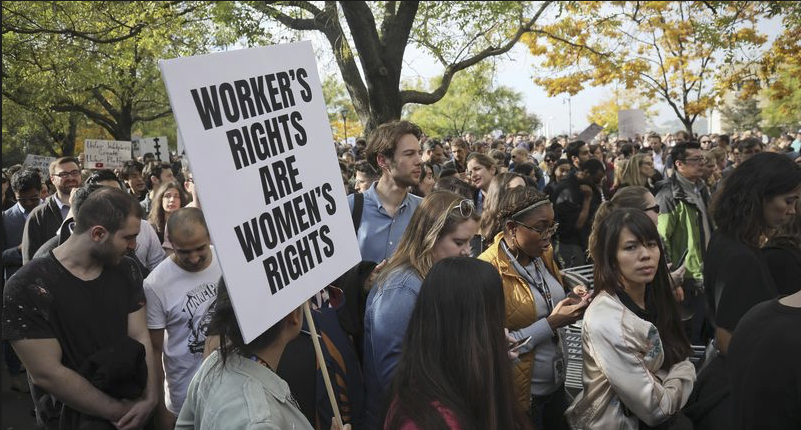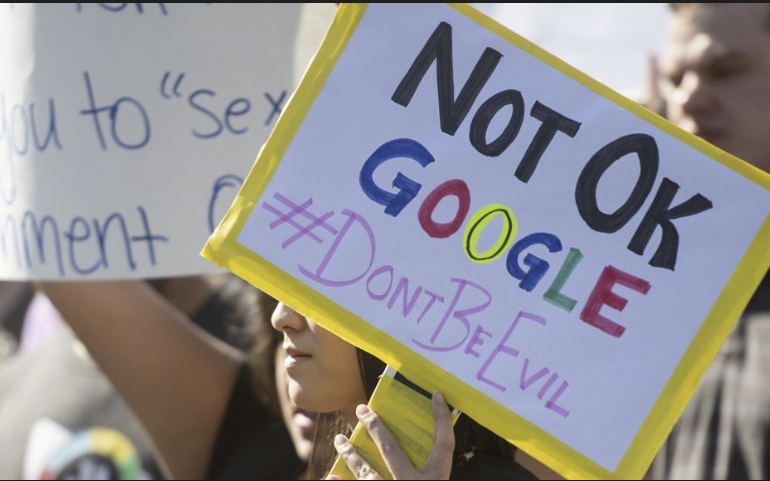Google, Amazon Walk-outs & Protests Aim to Keep Ethical Standards
Welcome to the year of tech employee dissatisfaction.
Three of the big tech companies have created thorny issues and ethical dilemmas for employees in their quest for great profits—and staffs are showing their ire publicly.
When Amazon employees learned last week that their company met with the U.S. Immigration and Customs Enforcement (ICE) agency over the summer to push its facial recognition software, at the same time migrant children were caged by ICE, a ripple of anger went through the ranks.
Just a week earlier, 17,000 Google employees walked out of offices across the world to protest sexual discrimination and harassment settlements that rewarded the offenders. The protests were in Tokyo, Singapore, London, Dublin and New York.

The protest resulted in some changes in policy on how sexual harassment claims are handled.
Amazon employees had already demanded that the company back off of software to help kill human “targets” in war zones via drones in earlier in 2018. Thousands signed a letter of protest and dozens quit the company. Amazon announced it won’t renew the contract with the Pentagon when it expires in 2019 in reaction to the widespread protests.
Last August, Google employees also protested plans to create a search engine called Dragonfly for China that censors results.
The upstart tech companies, like Google, which once promoted the idea “Do No Evil” have evolved into established take-no-prisoners public corporations that not only have dropped the pretense of merely seeking a better world, but have warmly embraced the military industrial complex and controversial privacy-invading technologies that have been criticized in China and other countries because they are used in oppressive ways to monitor citizens.
Facebook, too, potentially faces a $1.63 billion fine for the latest hack of its software from the European Union under the General Data Privacy Regulations (GDPR) for failing to meet standards for protecting the data of 50 million accounts. That follows the scandal involving Cambridge Analytica, which enabled the creation of fake accounts and manipulated data to impact the 2016 elections.
In Amazon’s latest burn on employee morale, CEO Jeff Bezos passed the buck to Andy Jassy, Amazon Web Services CEO, to explain the company’s decision to work with ICE.
“You want to make sure that people use the technology responsibly, and we have a set of terms and services in A.W.S. And with all our services, including Rekognition, where if people violate those terms of services and don’t use them responsibly, they won’t be able to use our services any longer,” Jassy said in a press release. “In fact, if we find people are violating folks’ constitutional rights, they won’t be able to use the services any longer. I also think, by the way, in a democracy [it] is also often the role and the responsibilities of the government to help specify what the guidelines and regulations should be about technology. And if and when that happens, we will abide by those as well.”
In other words, Amazon says the government should regulate it if what the company is doing is not kosher—it’s just doing its job as a technology provider. Snap.
Already the accuracy of Rekognition has been shown to be questionable: in a test by the American Civil Liberties Union, it identified 28 U.S. lawmakers as criminals.
“Surveillance technology in the hands of police is often wrongly used to target immigrants, communities of color, and political protesters,” said Kade Crockford, director of the ACLU’s Liberty Program, to Gizmodo.com. A ‘Terms of Service’ won’t change that.”
Protests by employees have had some impact, but long-term profits are undeniably the main focus of the companies, which bank on the idea that the more they pay, the more their workers will look the other way when faced with questionable tech development.
In spite of past Russian interference and manipulated messages, Google and Facebook were big winners in digital political ad buys this year, reaping a record $9 billion, according to The Boston Globe. Better procedures were put into place after the previous fiasco, but the companies still have a long way to go to prove they value quality of security as much as quantity of profits.








Leave A Comment